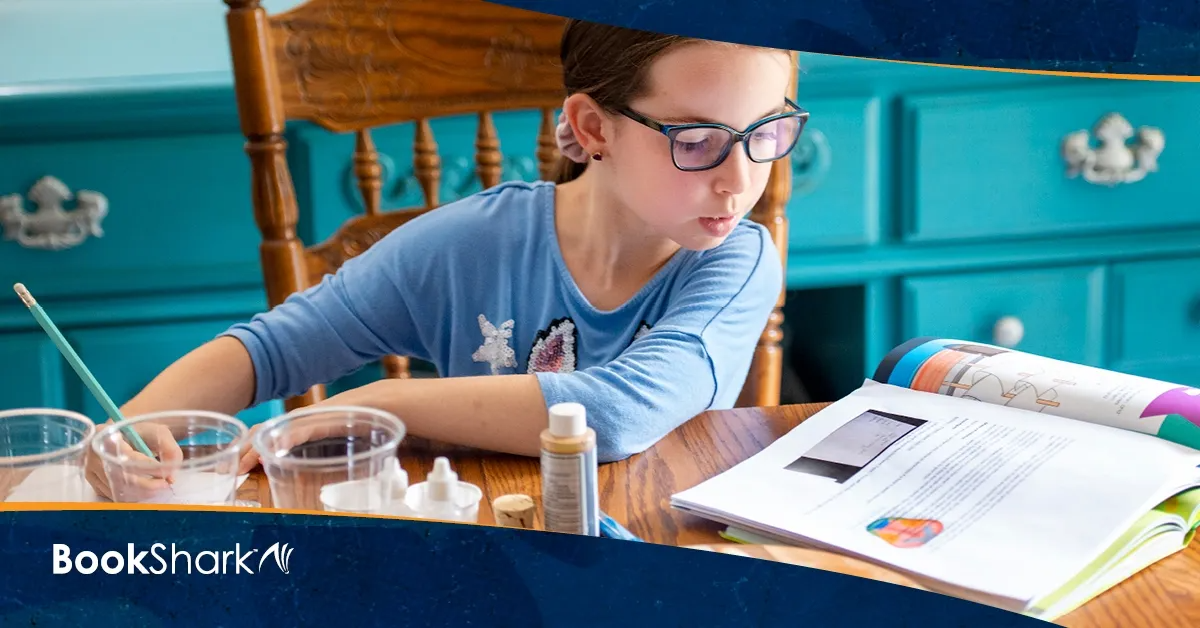On social media or while talking to other homeschool moms, new homeschoolers often ask how much time they should expect their school days to take, or what subjects they should cover. Inevitably, some more experienced parents advise them to simply make sure they cover the basics of language arts and math, or tell them they don’t need to do school more than a few hours a morning during the elementary years.
Although there’s nothing wrong with thinking through a schedule—what you will cover each day and how long it might take—there’s a danger when we seek the opinions of others who may not share our view of homeschooling. We can end up with a focus on doing the minimum required instead of nurturing the natural wonder and curiosity of childhood. We begin to view school as the things we have to do instead of the privilege of inspiring a love of learning.
Thomas Berry, twentieth century cultural historian said, “Our children should be properly introduced to the world in which they live.” There’s a lot of wisdom in that statement.
The Elementary Years Are for Exploration and Discovery
When we see learning as an adventure, we can inspire our children to view it in the same way. Instead of trying to figure out the minimum of what we can do, we need to ask how we can open up the world for our children.
“Teaching is not about answering questions but about raising questions—opening doors for them in places that they could not imagine.”—Yawar Baig
Young children are naturally curious. If you don’t believe that, spend time with them and count the number of times they ask why! Their questions aren’t easy to answer either. Consider one of the most common questions, “Why is the sky blue?” How do you explain the science in a way a young child can understand?
As homeschoolers, we want to encourage that curiosity, and learning history and science during the elementary years is all about exploration and discovery.
The times, people, and places that can only be visited through books open up a world bigger than the one they know. It captures their imaginations and answers so many of those burning why questions.

History and Science Strengthen Core Subjects
Traditional education models often separate subjects into neat little boxes. It’s the way most of us who attended public or private school grew up learning. We went to English and math and science classes—often moving from one classroom to the next. The early elementary years weren’t much different except we may have stayed in the same room.
With a literature-based approach like BookShark’s, subjects aren’t taught in isolation from one another but as a connected set of skills and knowledge.
Students read about history using living books. They learn language arts skills through copywork and dictation taken from those same books. They write about what they are learning—strengthening their writing skills while assimilating their knowledge of history.
BookShark Science includes a collection of real books, not textbooks, with hands-on experiments and activities. Students use math skills such as measuring and reading charts and graphs.
As students study and practice the skills of core subjects alongside the knowledge they encounter in history and science, they learn and remember. Our brains are designed to make connections.
“As we learn something new, cells that send and receive information about the task become more and more efficient. It takes less effort for them to signal the next cell about what’s going on. In a sense, the neurons become wired together.” —Alison Stevens, Learning Rewires the Brain
History and Science Prepare Students for Future Studies
Studies have shown that children who are read to and have access to books are better equipped to learn to read when they go to school. It makes sense that the same principle applies when it comes to learning history and science.
Extensive exposure to science and history will help them understand those subjects in a deeper, more complex way as they mature because they have been exposed to more concepts and scientific vocabulary.
BookShark History: The Story
Consider the etymology of the word history: “relation of incidents” (true or false), from Old French estoire, estorie “story; chronicle, history” (12c., Modern French histoire), from Latin historia “narrative of past events, account, tale, story”…
History is about story.
From the beginning of time, people passed down their history through stories. We remember stories better than a list of facts because story connects us and captures our imaginations. That’s why BookShark’s use of historical fiction and biographies fascinates elementary age children.

BookShark Science: The Spiral Approach
With BookShark science your children will learn about scientific ideas in a way that engages their curiosity in the elementary years through living books and hands-on experiments. Because BookShark uses a spiral approach, students encounter topics multiple times at more and more complex levels. Students can then build on that foundation in middle and high school years.
Your Elementary Students Need History and Science
Yes, need. Need means we require (something) because it is essential or very important.
When we see the elementary years through the lens of only what we have to study, we do a disservice to our children.
Although the core subjects of language arts and math lay a foundation of skills students use throughout their studies, history and science study speaks to the essence of who children are—curious individuals who are waiting to explore and discover the world around them. The study of history and science will strengthen core subjects as they are practiced and applied, and students will be well prepared for higher level learning.

